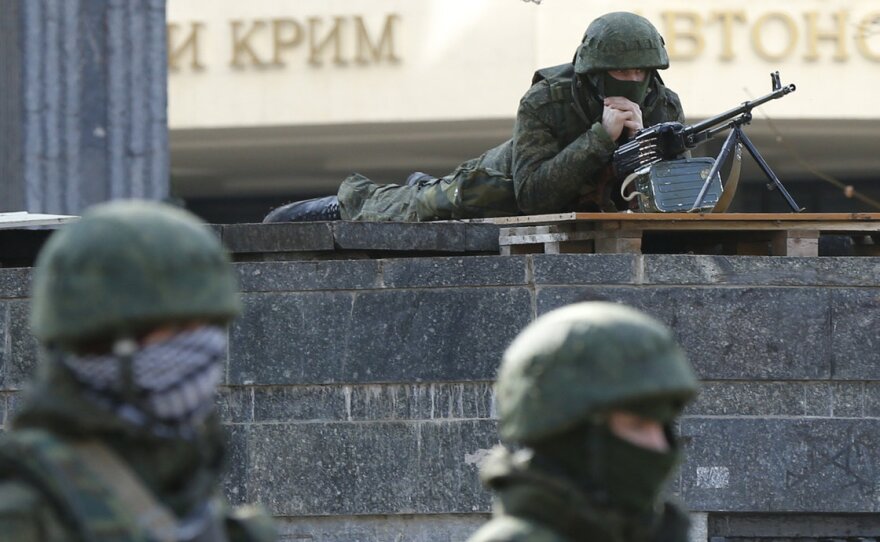This post was updated at 12:20 p.m. PT
Russia's parliament unanimously approved a request by President Vladimir Putin to authorize the intervention of Moscow's forces in Ukraine until "the normalization of the political situation" there. In response, Ukraine put its own forces on alerts and warned that a Russian invasion would spark war between the two countries.
The Federation Council vote came quickly after a formal appeal from Putin, but seemed to only rubber-stamp what has already occurred: Ukraine's defense minister said some 6,000 additional Russian troops are already in the Crimea in what appeared to be a move aimed at maintaining Kremlin access to the strategic peninsula, where Russia's Black Sea fleet is based.
After the vote, Putin spokesman Dmitry Peskov was quoted by Reuters as saying:
"[The] president [now] has received the full arsenal of means needed to resolve the situation, in terms of using [military] forces and in terms of taking decisions about [withdrawing] the head of our diplomatic mission in the United States."
Although the additional Russian force appeared, at least for now, to be limited to the Crimean peninsula, Putin's appeal, which called for authorizing force in the whole of the country, seemed to set up the possibility of a wider intervention.
The military moves, thus far involving mysterious balaclava-clad soldiers, follow the installation this week in Crimea of Sergiy Aksyono, a pro-Russian leader and the ouster a week ago of pro-Russian President Viktor Yanukovych.
Yanukovych fled to Russia and Aksyono asked Moscow for help in "stabilizing the region." The election of Aksyono, who claimed Saturday that he's coordinating directly with troops from Russia's Black Sea fleet and that those forces were guarding government buildings, has been deemed illegal by Kiev.
NPR's Emily Harris reports from the Ukrainian capital that the new government in Kiev has accused Russia of breaking an agreement on stationing troops in Crimea.
Russia's Interfax news agency quotes Ukraine's Prime Minister Arseny Yatsenyuk as demanding that Russia "recall their forces, and return them to their stations."
"Russian partners, stop provoking civil and military resistance in Ukraine," Yatsenyuk said in an apparent reference to pro-Russian partisans in eastern Ukraine.
Later, after a three-hour meeting with Ukraine's security and defense chiefs, Acting President Oleksander Turchinov said the country's military had been placed on combat alert. Yatsenyuk, who stood next to the president that a Russian invasion would represent "the beginning of war and the end of any relations between Ukraine and Russia."
Harris reports:
"Ukraine's defense minister says Russia has increased military personnel in Crimea by 6,000 troops. His office put out a statement saying if 'radical elements' enter Ukrainian military facilities in Crimea, [Ukrainian] soldiers will respond."
"Meanwhile, Russia's foreign ministry posted a statement claiming that overnight Friday an unknown, armed group from Kiev clashed with a local militia holding the interior ministry building in Crimea. There is no independent confirmation of that claim."
Russia's ambassador to the United Nations, Vitaly Churkin, says Russian military movements are within the purview of existing security arrangements between Kiev and Moscow.
"We have an agreement with Ukraine on the presence of the Russian Black Sea fleet with a base in Sevastopol, and we are acting within the framework of that agreement," he told reporters after a closed-door meeting of the U.N. Security Council.
He said Ukraine needs "to refrain from conducting a hasty presidential election. They need to stop trying to intimidate other regions and other political forces."
"Reports speak of a clash overnight in Crimea's capital and an attempt to seize a Ukrainian missile base."
"Ukraine's interim Prime Minister, Arseniy Yatsenyuk, accused Russia of seeking to provoke an escalation."
"The U.S. has called for urgent mediation."
As we reported on Friday, President Obama says he's "deeply concerned" by reports coming from the region, urging Moscow not to intervene and warning of unspecified "costs" from the U.S. and the international community that would result from Russian intervention.
Germany, which depends heavily on Russia for its natural gas supply, also had cautionary words for Moscow. Foreign Minister Frank-Walter Steinmeier on Saturday said the situation in Crimea "had become considerably more acute."
"Whoever pours more oil onto the flames now, with words or actions, is consciously aiming for further escalation of the situation," he said. "Everything Russia does in Crimea must be in keeping with the sovereignty and territorial integrity of Ukraine, and treaties on Russia's Black Sea fleet."
"We are holding the Russian government to its public statements on this," Steinmeier said. "And this entails also that Russia provides without delay complete transparency over the movements of its troops in Crimea, as well as its goals and intentions behind these."
U.K. Foreign Secretary William Hague has also expressed concern to his Russian counterpart, Sergei Lavrov.
"I told Minister Lavrov that Britain supports the Ukrainian government's request for urgent consultations in accordance with the 1994 Budapest Memorandum signed by the UK, US, Russia and Ukraine," Hague said, adding that London has "summoned the Russian Ambassador to the Foreign Office to register our deep concerns."
The EU foreign policy chief, Catherine Ashton, said Russia's decision was unwarranted.
"I therefore call upon the Russian Federation not to dispatch such troops but to promote its views through peaceful means," Ashton said in a written statement on Saturday.
She said she would meet with Lavrov after an extraordinary meeting of EU foreign ministers on Monday.
U.N. Secretary General Ban Ki-moon has called "for the full respect and preservation of the independence, sovereignty and territorial integrity of Ukraine," spokesman Martin Nesirky said.
The U.N. Security Council was due to meet Saturday afternoon in a session to discuss the Ukraine crisis.





